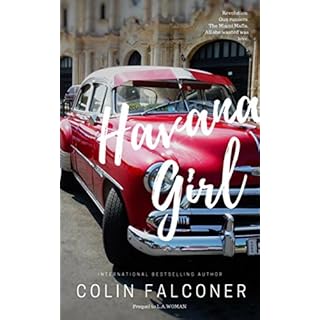Lights Out: A Cuban Memoir of Betrayal and Survival - Kindle edition by Dania Nasca. Politics & Social Sciences Kindle eBooks @ Amazon.com.
Kindle Store
›
Kindle eBooks
›
Politics & Social Sciences
Ad feedback


Dania was eleven the first time she meets a Judas Goat, a chivato. Likened to the goats that lead animals to the slaughter, the informants of communist Cuba would do anything to please the authorities. This one has his ear almost pressed against her neighbor’s door.
As an adult, Dania reflects on the chivato who terrified her. The incident sticks in her mind, and it isn’t the only danger she encounters under communist rule.
Suspicion and fear will follow.
Dania chronicles Fidel Castro’s rise to power and the truth behind the dictator. His fascination with Hitler, Mussolini, and other fascists lead to a totalitarian state of sorrow and pain.
At the same time, she shows a deep love and respect for the history and culture of Cuba.
Lights Out combines the childhood intimacy of Eire’s Waiting for Snow in Havana with the hard-hitting historical accuracy and relevance of Demick’s Nothing to Envy
Castro is determined to erase the past, but Lights Out is a monument to the Cuba before Castro.
by Dania Nasca (Author)
4.9 out of 5 stars 18 customer reviews
See all 2 formats and editions
Kindle
$3.03Read with Our Free App
Paperback
$11.136 Used from $11.4311 New from $11.13
Read less
Length: 302 pages Word Wise: Enabled Enhanced Typesetting:Enabled
Page Flip: Enabled
Ad feedback
Customers who bought this item also bought
Page 1 of 8Page 1 of 8This shopping feature will continue to load items. In order to navigate out of this carousel please use your heading shortcut key to navigate to the next or previous heading.
Back
Half Past Noon In Cuba: a Novel
Maximiliano Febles
4.5 out of 5 stars 23
Kindle Edition
$5.00
File Size: 4482 KB
Print Length: 302 pages
Simultaneous Device Usage: Unlimited
Publication Date: October 26, 2016
Sold by: Amazon Digital Services LLC
Language: English
ASIN: B01MG5NEL6
Text-to-Speech: Enabled

X-Ray:
More about the author
› Visit Amazon's Dania Rosa Nasca Page

Follow
Biography
Dania Rosa Nasca was born in 1958 in Holguín, the City of Parks, Oriente, Cuba, the year the Cuban Revolution drove Batista from power.
She lived in Cuba during Fidel Castro's hijacking of the Cuban government, his brutal consolidation of power, and his ill-advised and disastrous takeover of all private business. In 1970 at age twelve, with her parents and only a few other relatives, she immigrated to the United States on a U.S.-sponsored Freedom Flight.
She works as a financial counselor for the University of Rochester’s Strong Memorial Hospital. She closely follows world affairs, especially events in Cuba and other communist countries.
A proud Cuban American and a hockey mom who hates snow, she lives in Rochester, New York, with her husband, Tony, their son, Anthony, and their Chihuahua-Manchester terrier. Rochester has been her home ever since she arrived in the United States.
**If you read this book in any format, paperback,Kindle or KDP Select, please consider posting a review on AMAZON and or GOODREADS**
https://lightsoutacubanmemoir.blogspot.com
@DRNASCA
LIGHTS OUT was featured in January/February issue of Rochester Review, a University of Rochester publication.
Listen to author discuss Lights Out: a Cuban Memoir of Betrayal and Survival
WHAM 1180 Bob Lonsberry Show 11/3/2016 Show Recap
HOUR THREE| The hour begins with a call from Dania Nasca. She’s a Rochester woman who was born in Cuba and wrote a book about her experiences growing up in Communist Cuba and the rise of Fidel Castro.
http://wham1180.iheart.com/onair/bob-lonsberry-3440/show-recap-11316-15267137/#ixzz4OztszO2P
Show More
Sponsored products related to this item (What's this?)
Page 1 of 27Page 1 of 27
Previous page

DK Eyewitness Travel Guide: Sydney
DK Travel
9
Paperback
$14.83

DK Eyewitness Travel Guide: Cyprus
DK Travel
12
Paperback
$16.00

DK Eyewitness Travel Guide: Amsterdam
DK Travel
71
Paperback
$17.00

Havana Girl: passion and revolution in nineteen fifties Cuba
Colin Falconer
"Sweet, innocent beauty seeks perfect match. No gun-runners, mafia or Marxists. Just don't cross me."
37
Kindle Edition
$2.99

Alan F. Sewell
5.0 out of 5 starsFidel's betrayalApril 30, 2017
Format: Kindle Edition|Verified Purchase
I was in Colombia last November when Fidel Castro passed away. We were visiting my wife’s brother in Medellin. The household cheered the news of Castro’s death. “He will go straight to hell,” said my wife. “Yes,” explained my brother-in-law. “He gave the guerrillas 80% of the mines and bombs they used to murder Colombians.”
I’ve never been deluded about Castro. I knew he’d been a Communist ever since he visited the Soviet Union’s embassy in Cuba in 1943, when he was 17. He’s an admitted murderer of civilians, and very likely was a hired assassin who murdered politicians in Colombia during the 1940s. He hates the United States and blames our “imperialism” for the barbarities committed by Latin Americans against each other.
But didn’t Castro lead Cuba out of the barbarity of former Cuban President Batista’s banana republic police state? Hasn’t Castro, like many old revolutionaries, moderated his evil ways? For decades, I’ve read his editorials in Cuba’s Communist Party Paper “Granma.” It’s apparent that he was intelligent and very well read on science, politics, history, and current events. He even moderated some of his fierce hatred for the United States. He admitted that the USA is perceived to be a “paradise” and that it was understandable that Cubans and other Latin Americans would want to immigrate here. He admitted that Cuba “copied badly” from the Soviet Union’s model of Communism. Maybe he wasn’t such a bad guy after all.
“Oh, yes, he was,” declares author Dania, Nasca, born in 1958. She grew up as Castro seized power then slowly extinguished the prosperity, happiness, dignity, and life of the Cuban people. She tells how he confiscated property and businesses, put communist spies in every neighborhood, and ordered arbitrary arrests of anybody deemed to oppose his government, including her father, who was jailed a year for requesting permission to immigrate to the United States. Castro’s dictatorship became so extreme that he even forbade people to repair their residences, which under Cuba’s Communist Constitution, belonged to the state. Food became so difficult to obtain that Cubans starved in a country once known for its fantastically productive farms:
=====
In 1968 Fidel’s government announced that all home repairs in Cuba were the responsibility of the government. There were no supplies for the owners to fix their homes anyway, but people had made what efforts they could. Now buildings of all sorts started to decay, waiting for the government to come and repair them, which didn’t happen. Toilets backed up for lack of repair and lack of running water. We were lucky that we had the well and had plenty of water to keep the toilet flushed, even if we had to carry it in a leaky bucket. Imagine a whole nation waiting for the government to repair a toilet or a leaking roof.
And in the cities food was not legally available outside the system. I could now see that hunger was a problem for nearly everyone. With gaunt faces, my fellow Cubans walked slower, their heads tilted to one side. They rarely smiled, and on the street they looked straight ahead in sort of a glazed fashion. My own hunger pangs hurt more if I breathed in too deeply, so I automatically took short breaths. In school there were many like me—hungry, malnourished, and squeezed into mismatching clothes that didn’t fit any more. We were all doing the best we could with what we had.
I could tell visually who had access to more food than others. Usually they were the ones with the strongest communist party ties, so it was not a system where a country was only poor and there wasn’t enough.
School continued to be useless, with Lenin this and Ho Chi Minh that; Yankee imperialism and Americans are evil; Russia is our friend and the United States is our enemy, etc.
At home, my mother told me the truth: “Americans are good, communism is evil. Our heroes of liberty are Martí and Maceo, among others. Camilo Cienfuegos was all goodness; Fidel and Raúl, all evil. Che Guevara was an evil intruder in Cuba, just like the Russians and the Eastern Bloc are the intruders now.”
Communism strips you of your dignity, little by little until there is nothing left. It will take your livelihood, your body, your soul, and your mind until you have no spirit or any sense of self-responsibility, until you don’t know how to take care of yourself, until you are totally dependent on the government for the few scraps it throws at you.
=====
But didn’t Castro at least make improvements in education and medicine? No, says Dania Nasca. Cuba had competent doctors and teachers before Castro. The ones who came after were half-educated hacks and quacks. She describes Castro as a demented know-it-all who would never take advice from anybody. His revolution was a betrayal of the people and the nation of Cuba:
=====
Fidel’s betrayal was of a whole country; yet, to each Cuban, it felt very personal. My mother was one of the people who had adored Fidel, backed him, and supported him. The same Fidel mocked us…rubbing his betrayal and his deceit in Cuban faces.
Then there was the Bay of Pigs fiasco, and finally the U.S.–Russian agreement at the Missiles of October Crisis talks, which my mother had seen as the last opportunity for the United States to liberate Cuba and keep it from becoming a Russian satellite.
While others had already grieved Fidel’s betrayal and realized it was what it was, my mom didn’t start grieving until around 1968, when the truth finally hit her full force. The Americans were not coming. Cuba was doomed. It wasn’t just a bad dream or a temporary situation. This was it. The more time that went by, the more my mother’s brain became obsessed with Fidel’s betrayal. She was wired that way; it was beyond her control. While others had come to terms with Fidel’s evil deeds and carried on as best they could, she could not.
=====
Luckily, her father, after being jailed and having his business confiscated, was able to book a “Freedom Flight” to take the family to Miami. Coming to the USA, with its different language and culture, was yet another upheaval in the life of Dania Nasca, then a 12-year-old girl:
=====
Yet it was a new birth, a new life, breathing the pure oxygen of freedom instead of the stifling, lifeless, gray sludge water of Castro’s Cuba. We were reborn out of death. Cuba was not so lucky. Cuba’s revolution once seemed to be a new birth of freedom, heralded by one of the headiest and most exciting victory parades in human history and achieved by a remarkably unified national will. Yet what appeared to be a birth was actually the death of the republic.
=====
Besides portraying the malevolent evil of Castro, this book offers insights into Latin American culture. The extended family, including grandparents, aunts, uncles, and cousins, is a pillar of Latin American society. Families had their normal run of difficulties before Castro, as all families do, but also joyous moments. The joy went away when Castro seized power.
My takeaway is that the USA should have reclaimed administration of Cuba as soon as Castro rendered its prior civil government defunct. He was a degenerate Communist megalomaniac with no redeeming values. He has poisoned Cuba, and much of the rest of this Hemisphere, including Colombia, whose civil war with Cuban-supplied Marxist guerrillas killed tens of thousands; and now again with the catastrophe in Venezuela. Cuba trained Venezuela’s secret police to assassinate opposition leaders and even street protesters who are desperate to feed their children in a barbaric country whose government has seized control of farms and stores.
Fidel is dead, but his betrayal of Cuba, and all of Latin America lives on. It is possible that the leftist governments roiling Latin America will set the entire continent back into another century of stagnation while the rest of the world moves forward. If that happens, Castro’s dead hand will be responsible for spreading the misery he created while he lived.
Read more
10 people found this helpful
Helpful
Not Helpful|Comment|Report abuse
Frosty
5.0 out of 5 starsThis book was written beautifully with heartfelt accounts of life before communism and the ...December 10, 2017
Format: Paperback|Verified Purchase
I found this book so intriguing and had a hard time putting it down when I began to read it. This book was written beautifully with heartfelt accounts of life before communism and the tragedies of basic life necessities these wonderful people endured after communism. I truly cried a couple of times as I can't imagine why any one man could want to destroy a person's dreams and livelihood to support his family. I'm very hopeful the "new Cuba" (without Fidel) will prosper and return to its glory it so deserves. Lights out to all communism across the world. God Bless!
3 people found this helpful
Helpful
Not Helpful|Comment|Report abuse
Greg R
5.0 out of 5 starsThe family bonds of faith and love of this author’s family sustained them through it allMarch 5, 2017
Format: Paperback|Verified Purchase
A captivating and eye-opening read – an account of life in 1960’s Cuba under the communist rule of Fidel Castro. As viewed through the clear lens of the eyes of a child, this book chronicles the rapid and precipitous decline in quality of life for the island’s inhabitants, to the point of virtually snuffing out all hope and self-dignity. The author’s extensive research into Cuban history reveals the circumstances that set the stage for Fidel’s usurpation of power and essentially, his taking the Cuban people hostage.
As a life-long U.S. citizen, I now appreciate my country even more than ever, with all the rights and freedoms guaranteed by our constitutional government.
As much as Fidel and his regime attempted to destroy the spirit and will of the Cuban people, one thing clearly stands out as unbreakable. The family bonds of faith and love of this author’s family sustained them through it all. Thank God for that.
I highly recommend this book to anyone who wants a first person account of the oppression and hardships suffered under communist rule. This book masterfully dovetails the historical facts with personal experience to show how a whole population of good hearted people can be hood-winked by a deceitful and evil man.
Read less
4 people found this helpful
Helpful
Not Helpful|Comment|Report abuse
Kurt D. Diekelman
5.0 out of 5 starsVery good book.May 28, 2017
Format: Kindle Edition|Verified Purchase
When I bought this book I figured it would be interesting but it was actually way better than I expected it to be. The author does a great job of weaving her own family's history in with the history of the Cuban revolution and the consequences of the revolution. Highly recommended.
5 people found this helpful
Helpful
Not Helpful|Comment|Report abuse
Amazon Customer
4.0 out of 5 starsLife in Communist Cuba seen from the eyes of a girl growing up in a working class family.March 12, 2017
Format: Kindle Edition|Verified Purchase
I highly recommend this book to my friends. It is written by a Cuban from the same area of the island that I came from so I can testify to the veracity of her account. She is younger than me and was born a year before Castro took power in a humble hard working family. She describes the struggle for survival seen from the eyes of a child growing up in Communist Cuba. This is a testimony of what life in Cuba under Castro is like, seen from the eyes of a working class child. This is an important testimony at a time in which the world is absolving, forgiving and even justifying Castro for all the damage he has done to our country.
4 people found this helpful
Helpful
Not Helpful|Comment|Report abuse
bookclubber
4.0 out of 5 starsTimely personal reflection on Cuba since 1950July 10, 2017
Format: Kindle Edition|Verified Purchase
Real people. Real stories of lives and families forever changed. Recommend for anyone who wants to know about ordinary people in Cuba and the impact of the revolution
2 people found this helpful
Helpful
Not Helpful|Comment|Report abuse
Amazon Customer
5.0 out of 5 starsVisceral impactMarch 8, 2018
Format: Kindle Edition|Verified Purchase
I too escaped from communism in the Castro Bros’s Cuba. Her emotion-laden personal memoirs triggered my PTSD such that I was forced to put the book down to relax and breathe!
One person found this helpful
Helpful
Not Helpful|Comment|Report abuse
Marty Cole
5.0 out of 5 starsAwesome book! I love her style of writingAugust 8, 2017
Format: Kindle Edition|Verified Purchase
Awesome book! I love her style of writing.
2 people found this helpful
Helpful
Not Helpful|Comment|Report abuse
See all 18 reviews
Write a customer review
No comments:
Post a Comment